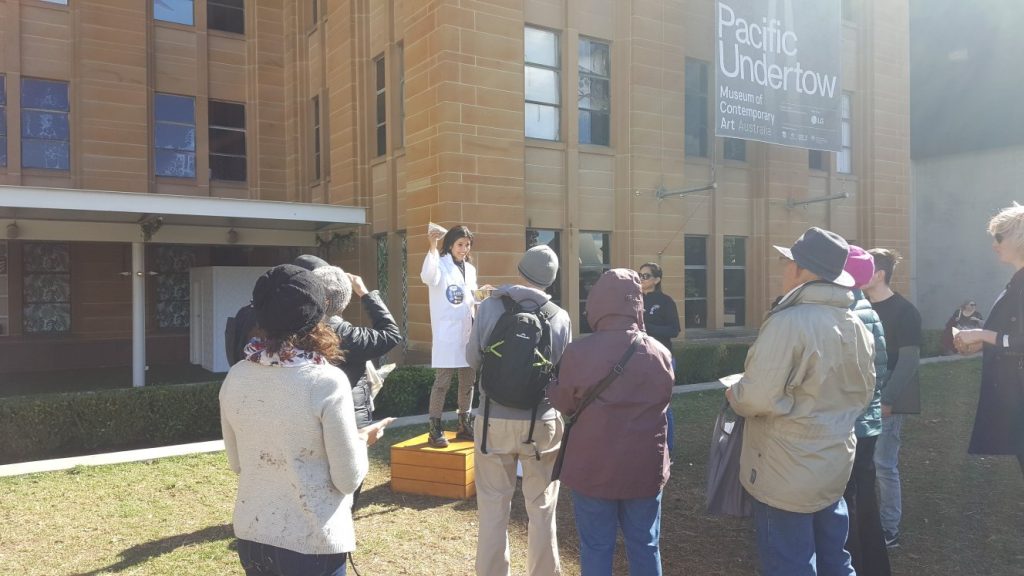By Poppy Watson
We know through surveys that many people believe that scientists should spend more time discussing their work with the public. We also know that representation of females in science is not great. But is there a way we can tackle both these issues?
Introducing Soapbox Science – a unique science-themed event where high-profile, female scientists discuss their work with anyone who will listen. The idea is simple – four ‘soapboxes’ are set up in a small central space and twelve female scientists have one hour each on one of the podiums. Members of the public can come and listen to each scientist talk about their work and ask questions or start discussions. People do not have to sign up and plan to go, they can spontaneously listen to and engage as they wander through town.
Founded in London in 2011, Soapbox Science has now spread to over 20 cities across the world. This year, it finally made its way to Sydney, taking part outside of the Museum of Contemporary Art at Circular Quay and featuring twelve scientists from local universities discussing subject matter ranging from volcanoes to quantum mechanics to the brain.

One of the soapboxes featuring Dr Domique Tanner with the iconic Sydney Opera House in the background.
I worked as a volunteer at the event, performing a range of tasks including directing people to the event, observing how long people stayed at the event, and organizing exit questionnaires. As the first four speakers took to their podiums, I was nervous. Would anyone would come and listen? Would they stay? Would they understand?

Me trying to lure crowds
I needn’t have worried – as soon as people saw what was happening or heard the word ‘science’ they headed over to check it out. Once there, most scientists only spoke for ten minutes about their research before having the rest of the hour flow organically as new people arrived and new discussions started up.
Whilst observing with the crowd – I also learnt a lot. Not only facts about science but also about how to communicate science effectively. For the first hour I observed people near the podium of Dr. Gal Winter who talked about: “The gut microbiome: Ask not what you can do for your microbes but what they can do for YOU”. Gal used some clever tricks to make her talk fun and engage people. As people approached, she said “catch” and chucked them a bag of sand weighing 1.5 kg to illustrate how much of our body weight (approx. ~2%) is made up of microbes. This trick meant that people moved closer to catch the bag and were then hooked into the topic. Lots of people wanted to talk about probiotics (whether they are worth it), links between gut microbes and depression, and fecal transplants. At one stage Dr Winter donned a Tina Turner wig and got the crowd to sing “What’s the gut got to do, got to do with it, what’s the gut but a host for a million microbes”…amazing.

Dr Gal Winter throwing bags of sand to her crowd.

Dr Lisa Williams on her soapbox.
I also learned a lot from my colleague Dr Lisa Williams from UNSW who talked about “Is the pursuit of happiness shortsighted?”. It turns out that pursuit of what makes us feel ‘happy’ is not a good strategy to wellbeing because happiness is a single, short-lived positive emotion. Instead, we should focus on a wider range of positive emotions by doing things that make us feel, for example, grateful or proud. This fascinating topic generated lots of discussions from the public on cultural differences in happiness expectations, vocabulary around emotions and whether tips given in women’s magazines are based in scientific evidence.
The people I interviewed at the end (ranging from 6 – 80 years old) said they thoroughly enjoyed the event – with all of them saying that they never or rarely attended science events and were just walking past but ended up staying to listen to all of the scientists.
So can Soapbox Science help scientists spend more time discussing their work with the public? Yes
Can Soapbox Science help improve representation of females in science? Definitely!
Will you see me on a soapbox next year? Watch this space!
Note: Soapbox Science Sydney was generously supported by UTS Faculty of Science, UTS Women in Engineering & IT, ACEMS, EQUS, FLEET, POCD Scientific, Franklin Women, Australian Science Communicators, National Science Week & Sydney Science Festival
Follow Poppy on Twitter